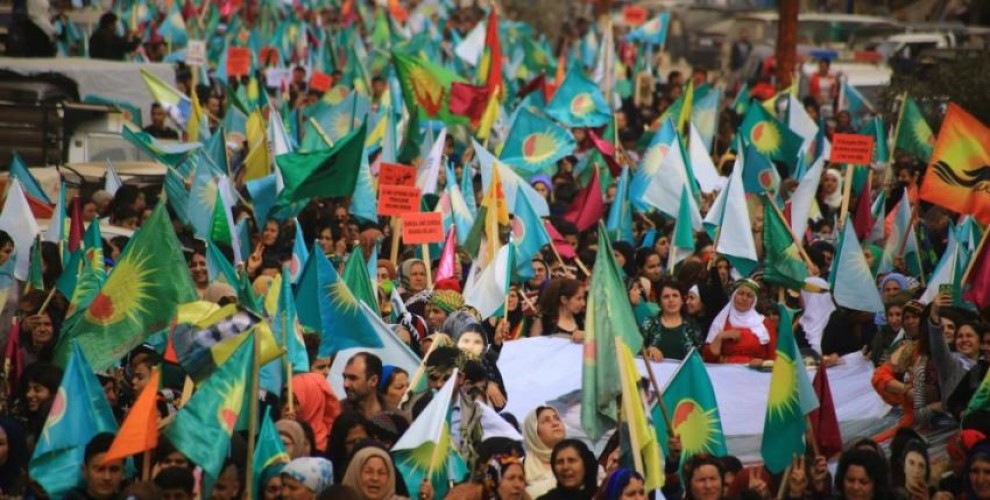Peace in Kurdistan writes to PM May on 8 March
Peace in Kurdistan, Women’s Alliance for Kurdistan, Iraq and Syria has sent an open letter to UK Prime Minister Theresa May has part of the 8 March initiatives.
Peace in Kurdistan, Women’s Alliance for Kurdistan, Iraq and Syria has sent an open letter to UK Prime Minister Theresa May has part of the 8 March initiatives.

On International Women’s Day, 8 March 2019, the Peace in Kurdistan Campaign has called on UK PM Theresa May “to acknowledge the great strides that Kurdish women have achieved towards gaining equality between women and men.”
In particular, said the letter, “this year we stand with Leyla Guven MP, who is now on day 121 of her indefinite hunger strike calling for an end to the cruel isolation of Abdullah Ocalan in prison on Imrali Island. Her immense strength and commitment to the struggle are an inspiration to us all. She, as a fellow MP, deserves the support of British Parliamentarians. She, like you, should be free to represent her constituents and to make critical comments on matters with which she does not agree. Instead, she was imprisoned and detained in solitary confinement for many months before starting her hunger strike. She believes, along with millions of other Kurdish people around the world, that the release of Ocalan is crucial to a peaceful, political settlement of the Kurdish Question.”
The letter called on May “to acknowledge her struggle for peace and fundamental rights for Ocalan and for all political prisoners.”
At this critical historical juncture, Peace in Kurdistan Campaign reiterates that “with the Kurdish-Turkish conflict looking likely to be re-ignited in North East Syria, where Turkey has the clear aim of crushing Kurdish identity and self-determination, the struggle of the Kurdish people for their genuine liberation remains as urgent as ever.”
On International Women’s Day, said the letter, “we particularly seek to highlight the democratic institutions that are being built in the area of North East Syria known as Rojava. There are autonomous structures based on communal organising, women’s councils, academies, and cooperatives, as well as women’s self-defence units. Legislation has been developed to address women’s aspirations for a better and more autonomous life, putting into action measures against child marriage, forced marriage, polygamy and harmful traditional practices. These imaginative and far sighted developments should be supported by everyone. There are even women’s courts for dealing with gender-based violence, and women’s policing strategies. Through women’s solidarity and engagement real change has been achieved in an incredibly short time and within very difficult circumstances. The growth in collective strength and women’s confidence is unprecedented in the region.”
The letter called on May to “demonstrate this support by specifically acknowledging the extraordinary achievements of these women. Tens of thousands of them have organised to defend their land, their lives, and their futures in Kobani, in Afrin and more widely in Rojava and North-East Syria. The resistance of the Women’s Defence Units (YPJ) and the Women’s Civil Defence Forces are part of a female global resistance against oppression, exploitation, and fascism. Their forces are currently holding the wives and children of captured ISIS fighters. It is unacceptable for the British government to champion women , while failing to support the women in Syria who have fought for us, who have developed a political system under which women can be free.”
The letter ended with a call on the UK Government to;
• Urge Turkey to renounce all plans for military intervention in the Kurdish regions of Syria - Rojava - in order to life the threat to people residing in those communities and permit them to rebuild their lives in peace.
• Block all British arms sales to Turkey at least while there is a real threat of their use against civilians which is a genuine fear given the appalling violations perpetrated by the Turkish armed forces against Kurdish communities in the recent period.
• Make the strongest representations to the Committee for the Prevention of Torture CPT to urgently intervene to end the isolation of jailed Kurdish leader Abdullah Ocalan by officially visiting him to verify his treatment, health and living conditions.
• Actively persuade the Turkish Justice Ministry to permit lawyers to meet Ocalan to allay the fears of his immediate family and the Kurdish people who remain steadfast in his support; ending Ocalan’s isolation is a key demand made of the Kurdish political figures currently engaged in hunger strikes;
• Most critically to urge the Turkish Government to change direction and move away from confrontation with the Kurds by restarting the peace process; recognising that opening negotiations is the only viable course of action for securing sustainable peace, stability and reconciliation between the Turkish State and the Kurds in the long term.”
Peace in Kurdistan Campaign Patrons are: John Austin, Christine Blower, NEU International Secretary, Prof Bill Bowring, Julie Christie, Noam Chomsky, Dr Cynthia Cockburn, Jeremy Corbyn MP, Prof Mary Davis, Lord Dholakia, Simon Dubbins, UNITE International Director, Jill Evans MEP, Lindsey German, Convenor STWC, Melanie Gingell, Rahila Gupta, Nick Hildyard, Dafydd Iwan, Former President Plaid Cymru, James Kelman, Bruce Kent, Jean Lambert MEP, Elfyn Llwyd, Aonghas MacNeacail, Scottish Gaelic poet, Mike Mansfield QC, Doug Nicholls, General Secretary, GFTU, Dr. Jessica Ayesha Northey, Sinn Fein MLA Conor Murphy, Dr Thomas Jeffrey Miley, Kate Osamor MP, Margaret Owen OBE, Gareth Peirce, Dr Felix Padel, Maxine Peake, Lord Rea, Joe Ryan, Stephen Smellie, Steve Sweeney, Dr Tove Skutnabb-Kangas, Dr Tom Wakeford, Dr Derek Wall, Julie Ward MEP, Hywel Williams MP.